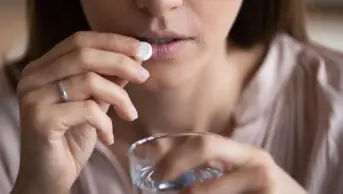
Adrià Volta
For people who have tried different antidepressants over several months or years without success, the idea of taking a medicine that could lift their depression in days, or even hours, must be an enticing prospect.
There is a large, unmet need for people with severe depression whose condition has not responded to standard treatments. Figures vary, but it is thought that around a third of people will not achieve remission after trying two or three antidepressants[1].
However, evidence has been building for a new generation of ‘rapid-acting’ antidepressants, which stand apart from traditional treatments for the most severe cases of depression — not only in their mechanism of action, but also in how quickly they work.
Most notably, these include the anaesthetic and analgesic drug ketamine and esketamine (Spravato; Janssen) — a potent form of ketamine delivered via nasal spray — which was licensed for treatment-resistant depression by regulators in the UK in December 2019.
However, since its licensing, there has been much debate over whether esketamine should be used in the NHS, and if so, how it should be offered.
Esketamine approval
Esketamine contains one of the enantiomers (mirror-image compounds) that make up ketamine. The treatment was licensed based on five phase III trials, which suggested the balance of benefit and risk was favourable where patients had not responded to at least two different antidepressants[2].
Off the back of these same five studies, the Scottish Medicines Consortium (SMC) gave esketamine the green light to be used in combination with a selective serotonin reuptake inhibitor or serotonin-norepinephrine reuptake inhibitor in September 2020[3].
The SMC particularly focused on the TRANSFORM-2 trial, results of which showed a four-point reduction in depression scores compared with placebo after four weeks[4].
In the multicentre trial, which was conducted in outpatient clinics, almost 200 patients completed the 28-day course of treatment and researchers reported clinically meaningful improvements as early as 24 hours after the first dose. But around 7% of patients in the esketamine arm, compared with 0.9% in the placebo arm, stopped treatment because of side effects, which included fainting, dizziness, anxiety and nausea. Esketamine can also cause a temporary rise in blood pressure.
The National Institute for Health and Care Excellence (NICE) looked at the same evidence but did not recommend esketamine for use in England and Wales in its draft guidance published in 2020. What followed were two years of appeals from both Janssen and the Royal College of Psychiatrists, before NICE finally rejected esketamine for treatment-resistant depression in 2022, after some tweaks[5].
The draft decision from NICE sparked debate over what the “comparator” should be, some of which seemed “illogical”, says Rupert McShane, consultant psychiatrist at Oxford Health NHS Foundation Trust, who runs Oxfordshire electroconvulsive therapy (ECT) and ketamine services.
NICE has chosen arbitrary hurdles and has applied those to esketamine that they haven’t applied to other medicines
David Nutt, professor of neuropsychopharmacology at Imperial College London
McShane was involved in writing the Royal College of Psychiatrists’ response to the draft NICE guidance, which said: “This decision sets a precedent which prevents any drug for treatment-resistant depression, however efficacious, ever meeting the bar that has been set, because of uncertainty in the data available for modelling.”
“NICE has chosen arbitrary hurdles and has applied those to esketamine that they haven’t applied to other medicines and created a whole series of additional challenges, like you have to show [the effect of esketamine] lasts for a year,” says David Nutt, professor of neuropsychopharmacology at Imperial College London, who has been working with a company using ketamine and other psychedelics in the treatment of addiction.
Steve Bazire, honorary professor at the School of Pharmacy, University of East Anglia, and a director at IT company Mistura Enterprise and Informatics, which runs mental health website portals, also notes that there was no mental health expert on the NICE committee.
Other countries are using esketamine more, we are an outlier on this
Steve Bazire, honorary professor at the School of Pharmacy, University of East Anglia
“If you have someone with treatment-resistant depression, there is no option really other than ECT. Other countries are using [esketamine] more, we are an outlier on this,” he says.
However, even where esketamine has been approved for use, such as in Scotland, prescribing has been limited. Public Health Scotland told The Pharmaceutical Journal that between September 2020 and June 2023, only 141 doses of the 28mg nasal spray had been used in hospital settings and 7 doses in primary care.
Too many uncertainties
On publishing the draft guidance, NICE said that it very much recognised the impact of treatment-resistant depression on people and their families, as well as the clear need for effective treatments. But it added that there were too many uncertainties over the benefits of esketamine compared with various alternatives, with questions remaining over long-term use and its cost effectiveness.
In its final guidance, NICE said that introducing esketamine into the NHS would be complex because services would need to be restructured (see Box).
Box: How would NHS services need to be restructured to accommodate rapid-acting antidepressants?
While GPs manage most antidepressant prescribing for patients with depression, esketamine must be prescribed by a psychiatrist. The treatment can cause dissociation and sometimes hallucinatory effects that mean patients have to be observed in the clinic after being treated until considered clinically stable. It can also cause an increase in blood pressure, which must be monitored after administration. This means patients would have to attend hospital or a community clinic twice per week for two-hour visits and then weekly or fortnightly for some time.
“There are practical barriers to using these medicines,” explains Orla Macdonald, lead research pharmacist at Oxford Health NHS Foundation Trust and council member of the College of Mental Health Pharmacy. Those barriers apply to both esketamine and intravenous ketamine, she explains, which adds to the cost of their use.
“Patients are not allowed to drive after the [ketamine] infusions, which introduces further barriers to those living at a distance from the hospital. And, of course, hospitals need expert staff and space to be able to run these clinics.”
Rupert McShane, consultant psychiatrist at Oxford Health NHS Foundation Trust, argues that ketamine administration is something that could be managed through an expansion of existing interventional psychiatry services, overseen by specialists.
NICE also said the trial data excluded people with certain characteristics of depression, such as psychosis or recent suicidal ideation with intent, which limits how well the results can be applied since people having treatment for depression in the NHS may have these symptoms.
The company had put forward esketamine for use in people who have tried at least three antidepressants, which was how clinical experts had advised it would likely be used in NHS practice. But this meant that the clinical evidence only considered a small number of people from the full clinical trial population.
Other questions remain around how long people would need to take esketamine for, with more research needed on this, NICE added. One model put forward by the company had looked at the cost-effectiveness of treatment over a 20-year period but “the long-term evidence of esketamine is too uncertain” to justify those calculations, the committee said.
“Esketamine is very expensive,” says McShane. “And there isn’t any good information about how long you need to carry on with it. From the NICE perspective, they needed to be more certain, and I can understand that. I do think we have to get used to the idea that depression is, for many people, a chronic condition.” The NHS list price for esketamine is £163 per dose.
After the NICE guidance was published, results from patient subgroups with two or three prior treatment failures in the ESCAPE-TRD study were presented at the Royal College of Psychiatrists’ international conference in July 2023. The study of just over 400 patients with major depressive disorder compared esketamine and the antipsychotic drug quetiapine, and found “consistently higher” remission rates with esketamine, particularly in those with three or more previous treatment failures. Those patients were 2.6 times more likely to achieve remission by week 8. Researchers also reported a shorter time to remission[6].
The study also found that, a greater proportion of patients with three or more prior treatment failures in the esketamine group had not relapsed by 32 weeks after remission at week 8 (18.2% compared with 7.8% for quetiapine).
Safety is another concern considered by NICE and others, since there is the potential for abuse, dependence and diversion with esketamine, which is a Schedule 2 controlled drug. In response to a request from the Medicines and Healthcare products Regulatory Agency for additional risk minimisation measures, Janssen set up a register and alert system in April 2022, which all patients prescribed esketamine must be enrolled on.
Ketamine conundrum
The potential for abuse is an argument that has also been made for ketamine and there is a certain amount of stigma attached to its use. “You do hear the argument about a slippery slope,” says McShane. “But I think the NHS is in a good position to manage this and we have the structures to make sure that doesn’t happen. Likewise, I don’t think it would lead to services being overwhelmed.”
Ketamine is an NMDA receptor antagonist which increases levels of glutamate in the brain and can be used alongside other antidepressants. As a generic drug, it is significantly cheaper than esketamine, at about £7 per dose. However, ketamine is not licensed for the treatment of depression because no company has applied for a marketing authorisation.
Studies, including a UK trial funded by the National Institute for Health Research, have repeatedly shown substantial and rapid antidepressant effects from ketamine in people who have severe depression where no other treatment has worked[7].
There is a conservatism about the use of rapid-acting antidepressants
David Nutt, professor of neuropsychopharmacology at Imperial College London
In the UK, patients can access treatment with ketamine privately and, according to McShane, there are half a dozen NHS trusts who use the drug off label in a small number of patients. But because these treatments are new and work in a different way, “there is a conservatism about their use”, points out Nutt.
Evidence for the effectiveness of ketamine, given as an intravenous infusion, for treatment-resistant depression has been building for two decades, say its proponents.
“The first trial that showed ketamine to be a potent antidepressant was done 23 years ago,” says McShane[8].
He led the first UK study of ketamine use in depression in 2014[7]. Many studies have been conducted since, but, most recently, two randomised head-to-head trials, one in 2021[9] and one in 2023[10], concluded ketamine could be an alternative to ECT.
The first study, published in The New England Journal of Medicine, randomised 403 patients and found 55.4% of those in the ketamine group and 41.2% in the ECT group had a response. Improvement in patient-reported quality of life was similar in the two groups[9]. The most recent study, looking at ketamine as an alternative to ECT for depression in 186 hospitalised patients, found that 46.3% showed remission with the ketamine infusion compared with 62.6% who received ECT. However, given the more serious side effects with ECT, including persistent amnesia, the researchers concluded that ketamine could be a “safe and valuable” alternative[10].
McShane agrees that ketamine administration could be a useful alternative to ECT. “It could help to fill some of the gaps in treatment.”
He believes a potential way to overcome the licensing issue with ketamine is through the government’s Medicines Repurposing Programme, a multi-agency initiative that aims to facilitate and encourage the licensing of repurposed medicines. “I think that is something we should be looking at. Ketamine is cheap and it is a drug that people find effective.”
There are of course side effects, such as dissociation, nausea and vomiting, anxiety, headache and tinnitus, and around 10% of people will have a “very challenging” experience with ketamine that will mean they need to stop treatment[11].
Postpartum depression
Further down the line are rapid-acting antidepressants specifically indicated for severe postpartum depression. Brexanolone (Zulresso; Sage Therapeutics) is a neuroactive steroid that binds to GABA receptors in the brain and is given as an infusion over 60 hours with a rapid onset of action and effects that last up to 30 days[12].
In August 2023, an oral form of the drug — zuranolone (Zurzuvae; Sage Therapeutics/Biogen) — was approved after two randomised, double-blind trials showing significant improvement in symptoms after 15 days compared with placebo. While still a controlled drug, the ability to take a daily pill is a “game-changer” for treating postpartum depression, the company said[13].
When it comes to brexanolone and zuranolone, neither is licensed for use in the UK and, even in the United States, brexanolone is only being used for inpatients at specially approved hospitals in small numbers. Cochrane reviewers are in the process of looking at the effectiveness and safety of brexanolone and related drugs for postpartum depression, but a lot more research will likely be needed before any use in the UK[14].
Treatments that require attendance at a hospital or clinic can present significant practical barriers to patients
Orla Macdonald, lead research pharmacist at Oxford Health NHS Foundation Trust
Orla Macdonald, lead research pharmacist at Oxford Health NHS Foundation Trust and council member of the College of Mental Health Pharmacy, notes there is both an interest and a need for better treatments for postpartum depression and psychosis. “Yet, I can understand why prescribers might also be quite cautious about using new treatments, especially if the mum is breastfeeding. Within the trials, mothers were not allowed to breastfeed, and so the evidence for risk of use during lactation is very limited,” she explains.
As with ketamine and esketamine, there are also practical barriers.
“Whilst these are exciting new treatments and we are looking forward to further developments that will help our patients with this debilitating illness, treatments that require attendance at a hospital or clinic can present significant practical barriers to patients,” adds Macdonald.
The future
Amidst the debate, there is a clear need for effective and faster-acting antidepressants for the substantial group of patients with depression who do not respond to traditional treatments. But, as demonstrated in Scotland, simply approving the NHS use of a treatment such as esketamine does not mean it will take off. For the NHS, the barriers seem to largely be ones of practicality and how to design services to make use of a drug that requires patients to attend and be monitored in a clinic.
“A key ambition of the NHS mental health implementation plan is to move away from hospital-led treatment and encourage the development of community- and home-based specialist treatment services across the board,” says Macdonald. “It is an unfortunate paradox that these new treatments require a hospital or clinic setting for safe delivery.”
McShane says that, having treated patients with ketamine for well over a decade, he had expected its use to grow far more than it has, noting that it has taken off in both the United States and Europe. “I do think we should be getting on with this and the first area we should be looking at is ketamine as an alternative to ECT, particularly for young people.”
- 1Voineskos D, Daskalakis ZJ, Blumberger DM. <p>Management of Treatment-Resistant Depression: Challenges and Strategies</p> NDT. 2020;Volume 16:221–34. doi:10.2147/ndt.s198774
- 2Assessment report: Spravato. European Medicines Agency. 2019.https://www.ema.europa.eu/en/documents/assessment-report/spravato-epar-public-assessment-report_en.pdf (accessed 12 Sep 2023).
- 3esketamine (Spravato). Scottish Medicines Consortium. 2020.https://www.scottishmedicines.org.uk/medicines-advice/esketamine-spravato-full-smc2258/ (accessed 12 Sep 2023).
- 4Popova V, Daly EJ, Trivedi M, et al. Efficacy and Safety of Flexibly Dosed Esketamine Nasal Spray Combined With a Newly Initiated Oral Antidepressant in Treatment-Resistant Depression: A Randomized Double-Blind Active-Controlled Study. AJP. 2019;176:428–38. doi:10.1176/appi.ajp.2019.19020172
- 5Esketamine nasal spray for treatment-resistant depression. National Institute for Health and Care Excellence. 2022.https://www.nice.org.uk/guidance/ta854/chapter/1-Recommendations (accessed 12 Sep 2023).
- 6Young A, Cubala W, Nielsen R, et al. Esketamine nasal spray improves rate and time to remission versus quetiapine extended release in subgroups of patients with treatment resistant depression and two or three plus prior treatment failures: Results from ESCAPE-TRD, a randomised phase IIIb trial. Poster Sessions Online. 2023.https://www.postersessiononline.eu/173580348_eu/congresos/RCPSych2023/aula/-PO_424_RCPSych2023.pdf (accessed 12 Sep 2023).
- 7Diamond PR, Farmery AD, Atkinson S, et al. Ketamine infusions for treatment resistant depression: a series of 28 patients treated weekly or twice weekly in an ECT clinic. J Psychopharmacol. 2014;28:536–44. doi:10.1177/0269881114527361
- 8Berman RM, Cappiello A, Anand A, et al. Antidepressant effects of ketamine in depressed patients. Biological Psychiatry. 2000;47:351–4. doi:10.1016/s0006-3223(99)00230-9
- 9Ekstrand J, Fattah C, Persson M, et al. Racemic Ketamine as an Alternative to Electroconvulsive Therapy for Unipolar Depression: A Randomized, Open-Label, Non-Inferiority Trial (KetECT). International Journal of Neuropsychopharmacology. 2021;25:339–49. doi:10.1093/ijnp/pyab088
- 10Anand A, Mathew SJ, Sanacora G, et al. Ketamine versus ECT for Nonpsychotic Treatment-Resistant Major Depression. N Engl J Med. 2023;388:2315–25. doi:10.1056/nejmoa2302399
- 11Ketamine treatment service. Oxford Health NHS Foundation Trust. https://www.oxfordhealth.nhs.uk/ketamine/risks-benefits/ (accessed 12 Sep 2023).
- 12Azhar Y, Din A. Brexanolone. National Library of Medicine. 2023.https://www.ncbi.nlm.nih.gov/books/NBK541054/ (accessed 12 Sep 2023).
- 13FDA Approves ZURZUVAETM (zuranolone), the First and Only Oral Treatment Approved for Women with Postpartum Depression, and Issues a Complete Response Letter for Major Depressive Disorder. Biogen. 2023.https://investors.biogen.com/news-releases/news-release-details/fda-approves-zurzuvaetm-zuranolone-first-and-only-oral-treatment (accessed 12 Sep 2023).
- 14Wilson CA, Robertson L, Brown JVE, et al. Brexanolone and related neurosteroid GABA(A) positive allosteric modulators for postnatal depression. Cochrane Database of Systematic Reviews. 2021. doi:10.1002/14651858.cd014624
- This article was corrected on 25 September 2023 because one of the pull quotes was incorrectly attributed to Rupert McShane rather than David Nutt
3 comments
You must be logged in to post a comment.



I read Dawn Connelly's article on esketamine with interest. DTB published an article on this medicine in 2020 (Esketamine for treatment-resistant depression. Drug and Therapeutics Bulletin 2020;58:183-188) and it appears that many of the issues we highlighted have yet to be resolved.
A couple of points are worth noting. Firstly, the results of the ESCAPE-TRD study are taken from a poster, which was reviewed by the RCPsych Academic Faculty rather than by the standard BJPsych Open peer review process. It is not clear if the full results have been published in a peer reviewed journal.
Secondly, the article includes comments from various healthcare professionals but does not include any declarations of competing interests for those healthcare professionals. Although readers can search the ABPI's Disclosure UK website (https://search.disclosureuk.org.uk/), I would urge the PJ to include declarations of competing interests for healthcare professionals who are quoted in its articles.
Readers may also be interested to see that the UK Government is currently consulting on "legislation to place a duty on manufacturers and commercial suppliers of medicines, devices and borderline substances to report details of the payments and other benefits they provide to healthcare professionals and organisations". I would urge readers to contribute to the consultation (https://consultations.dhsc.gov.uk/en/64d60a6e9708bb745e0cb76b). As Sydney Wolfe (founder of Public Citizen's Health Research Group) noted in an article in DTB (Wolfe S. Mandatory disclosure of all pharmaceutical and medical device companies’ payments to healthcare providers: learning from the USA. Drug and Therapeutics Bulletin 2022;60:52-55), "Unfortunately, the UK as well as many European countries lack laws mandating such disclosure. Mandatory disclosure, though not sufficient in itself, can pave the way for other necessary changes. Declaring conflicts is only the first step in dealing with this problem’, but ‘Disclosure is not enough. The ultimate solution is to eliminate all industry relationships from the practice of medicine’."
David Phizackerley
Deputy Editor
Drug and Therapeutics Bulletin
BMJ Journals
BMA House, Tavistock Square, London, WC1H 9JR
Dear David,
Thank you for your comment regarding the results of the ESCAPE-TRD study. Please be assured that your points around including declarations of competing interests in PJ articles are under consideration.
Best wishes,
Carolyn Wickware
Executive editor
I think it's probably also worth a comment that since the esketamine was approved in 2019 (which we have used here) under SMC there's been this small issue of a global pandemic. We had some fo the mental health facilty reallocated to palliative care patints for a while. We were going what we could. Mental health referrals have gone through the roof since and staff who were told they needed to stretch for a period of time to get us through the COVID emergency are still waiting for when they can relax to a more reasonable level of activity.
Both the nasal spray and the ketamine injection require staffing and a bed for the person for a period of time and many hospital are running at poor staffing levels and over capacity on beds.
I think it would be wrong to assume or suggestthat there isn't an appetite to treat people with these options but neither of these treatments are as simple as oral medication and are both costly in staff and facility requirements to facilitate in the context of a hugely over worked NHS where we are tasked to save the money that was spent over COVID.